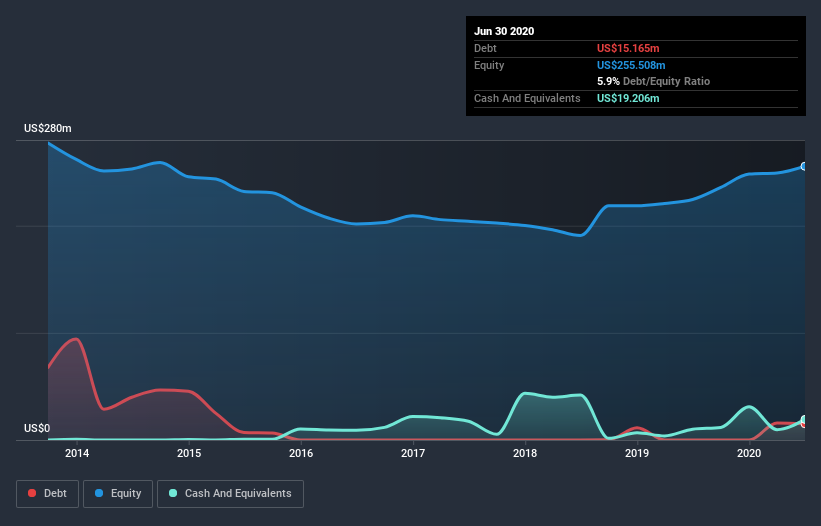We Think Northwest Pipe (NASDAQ:NWPX) Can Manage Its Debt With Ease

Legendary fund manager Li Lu (who Charlie Munger backed) once said, 'The biggest investment risk is not the volatility of prices, but whether you will suffer a permanent loss of capital.' So it seems the smart money knows that debt - which is usually involved in bankruptcies - is a very important factor, when you assess how risky a company is. We note that Northwest Pipe Company (NASDAQ:NWPX) does have debt on its balance sheet. But the more important question is: how much risk is that debt creating?
What Risk Does Debt Bring?
Debt assists a business until the business has trouble paying it off, either with new capital or with free cash flow. If things get really bad, the lenders can take control of the business. However, a more usual (but still expensive) situation is where a company must dilute shareholders at a cheap share price simply to get debt under control. Having said that, the most common situation is where a company manages its debt reasonably well - and to its own advantage. The first step when considering a company's debt levels is to consider its cash and debt together.
Check out our latest analysis for Northwest Pipe
What Is Northwest Pipe's Debt?
The image below, which you can click on for greater detail, shows that at June 2020 Northwest Pipe had debt of US$15.2m, up from none in one year. However, it does have US$19.2m in cash offsetting this, leading to net cash of US$4.04m.
How Healthy Is Northwest Pipe's Balance Sheet?
The latest balance sheet data shows that Northwest Pipe had liabilities of US$35.1m due within a year, and liabilities of US$61.1m falling due after that. Offsetting these obligations, it had cash of US$19.2m as well as receivables valued at US$114.1m due within 12 months. So it can boast US$37.1m more liquid assets than total liabilities.
This short term liquidity is a sign that Northwest Pipe could probably pay off its debt with ease, as its balance sheet is far from stretched. Simply put, the fact that Northwest Pipe has more cash than debt is arguably a good indication that it can manage its debt safely.
On top of that, Northwest Pipe grew its EBIT by 89% over the last twelve months, and that growth will make it easier to handle its debt. The balance sheet is clearly the area to focus on when you are analysing debt. But it is future earnings, more than anything, that will determine Northwest Pipe's ability to maintain a healthy balance sheet going forward. So if you're focused on the future you can check out this free report showing analyst profit forecasts.
Finally, while the tax-man may adore accounting profits, lenders only accept cold hard cash. Northwest Pipe may have net cash on the balance sheet, but it is still interesting to look at how well the business converts its earnings before interest and tax (EBIT) to free cash flow, because that will influence both its need for, and its capacity to manage debt. Over the last two years, Northwest Pipe recorded free cash flow worth a fulsome 87% of its EBIT, which is stronger than we'd usually expect. That puts it in a very strong position to pay down debt.
Summing up
While it is always sensible to investigate a company's debt, in this case Northwest Pipe has US$4.04m in net cash and a decent-looking balance sheet. And it impressed us with free cash flow of US$42m, being 87% of its EBIT. So is Northwest Pipe's debt a risk? It doesn't seem so to us. The balance sheet is clearly the area to focus on when you are analysing debt. However, not all investment risk resides within the balance sheet - far from it. Like risks, for instance. Every company has them, and we've spotted 2 warning signs for Northwest Pipe (of which 1 can't be ignored!) you should know about.
When all is said and done, sometimes its easier to focus on companies that don't even need debt. Readers can access a list of growth stocks with zero net debt 100% free, right now.
This article by Simply Wall St is general in nature. It does not constitute a recommendation to buy or sell any stock, and does not take account of your objectives, or your financial situation. We aim to bring you long-term focused analysis driven by fundamental data. Note that our analysis may not factor in the latest price-sensitive company announcements or qualitative material. Simply Wall St has no position in any stocks mentioned.
Have feedback on this article? Concerned about the content? Get in touch with us directly. Alternatively, email editorial-team@simplywallst.com.

 Yahoo News
Yahoo News 

